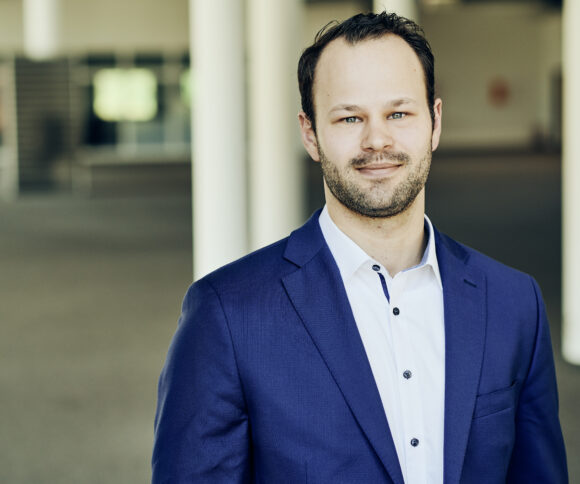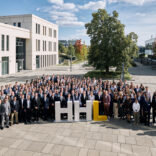
Bringing the Entrepreneurial Spirit to an Established Company
Career update: Since July 2022 Oliver Prostak is Co-CEO and Managing Director at Meridiam Glasfaser
Interview with Oliver Prostak, Co-CEO at Glasfaser Nordwest
This interview was first published in September 2020.
Oliver Prostak has many years of experience in the telecommunication industry, having spent 10 years working for the Deutsche Telekom. Since graduating from his part-time Master in Management at HHL in 2016, he has moved on to becoming the Co-Ceo of Glasfaser Nordwest, a Join Venture by Deutsche Telekom and EWE AG.
In this interview he talks about how HHL’s entrepreneurial spirit led him to become an intrapreneur in a new joint venture and why age should never be a limit for achieving your goals. Read on to learn how the HHL Career Development team acted as a neutral spearing partner and why being surrounded by like-minded people is vital for successful work.
“I knew that I wanted to be a manager since I was 12 years old even though I did not really know what that meant at that young age.”
You just recently joined Glasfaser Nordwest as the Co-CEO. What is Glasfaser’s vision and how are you working on bringing it to life?
Our mission is to supply every second household in north-west Germany with fibre optics within the next 10 years. We are creating an open access fibre optic infrastructure, allowing all telecommunication providers to use the infrastructure for providing customers with high bandwidth products.
Our infrastructure is open to all providers for the same conditions like price, performance and so forth. In general we strive to become the most digital Carrier in Germany.
We have recruited the best employees coming from our shareholders Deutsche Telekom and EWE, as well as from other companies and universities which are not connected to Telekom and EWE. With the knowledge of two big players in the telecommunication market and the drive of our employees we are creating an infrastructure that has never been created before. In addition to that we are developing our own IT-Architecture to ensure only the best customer journeys for our providers and partners.
Looking back at the beginning of your career – how has you vision for your career changed?
My vision has not changed that much. I knew that I wanted to be a manager since I was 12 years old even though I did not really know what that meant at that young age.
I started my studies and my career at Deutsche Telekom as a part-time bachelor student, when I was 18 years old. My first goal at Deutsche Telekom was to be as good as the experts on my team, but I soon realized that being an expert was not enough for me. I wanted to be more than that.
Through hard work I got my first offer to be a team leader at Deutsche Telekom at only 21 years old. After that they told me that I will not become anything more important than a team leader before I turn 30, but I did not accept that.
“The entrepreneurial spirit at HHL was always inspiring.”
Why would my age define my career? Looking back, I managed to prove them wrong. After my bachelor’s degree I decided to come to HHL for my masters. During my studies I founded two start-up companies, always wanting to reach my goal of becoming a CEO one day. I learned a lot of valuable skills for my following career from founding these start-ups, but I also soon realized that I would rather work and lead an already founded company.
The complexity of the telecommunication industry is still fascinating for me. Considering all the different aspects like regulation, Engineering, IT and market analysis my job offers variation every single day and it never gets old. The entrepreneurial spirit at HHL was always inspiring. Originally, I was the Whole-Sale expert for Glasfaser Nordwest, but hard work and engagement always pays off, so unexpectedly I got the offer to become Co-CEO and that is how I found my way to Oldenburg.
How did the HHL Career Services support you during studies and after graduation?
The HHL Career service has helped me prepare for assessment centers for various application processes. They have also shared their knowledge considering the salary negotiations with Glasfaser Nordwest. Because let’s be real, no one knows what an appropriate salary for a 30-year-old CEO really is. That helped me a lot. They were always really friendly and openminded, which encouraged students to ask them for honest advice.
The Career Development team took my questions and topics very seriously and were quick in giving the perfect answers. Another helpful service is, that they support your journey on finding your first or a new mentor. They also gave us tips from a neutral, external perspective.
How has studying at HHL influenced your career up to this point?
What makes HHL special and different is that all students are very driven and have big goals in life. The other students are really motivated and goal-oriented people. It helps a lot to be surrounded by students with the same mindset. They were all focused on doing more than good work and that effects everyone around them.
“It helps a lot to be surrounded by students with the same mindset.”
It also additionally inspired me to reach for more. When working on group projects, like-minded people can work together perfectly. Everyone wants to be the best and therefore contributes a lot to make the whole group successful. No one said a word when we occasionally had to work on weekends or early mornings, because everyone had the same drive. Personal sensitivities were put to the side, because being successful was very important to everyone in the group.
My favorite and at the same time most helpful course was “Negotiations”. It still influences some of my actions until this day. In only two days we learned every possible type of negotiations from easy tasks up to very complex scenarios. The professor was an absolute perfectionist in his job, which made the course even more enjoyable.
“Create a strong community with your colleges and fellow students. It will help everyone a lot to work on tasks together.”
You studied the part-time Master in Management (in Cologne) while working for Deutsche Telekom? What is your personal recipe for a good work-study-life balance?
First, you need to accept your situation. It will be hard and a lot of work, but it will also be a very short amount of time when you are looking back at your life someday.
You should never put too much pressure on yourself and take it easy. You will achieve more when you are aware of yourself and your workload. Pressure and self-doubt will take away your focus. It is okay to make mistakes. See them as an opportunity and not as a threat. If you feel like you are not able to focus, take some time off and do something that makes you happy and clears your mind.
“Pressure and self-doubt will take away your focus. It is okay to make mistakes.”
Another tip is to work on your self-reflection. It is okay to be overwhelmed and you need to learn to accept and most importantly to communicate if you have too much work to do. There will always be someone who can help you. Create a strong community with your colleges and fellow students. It will help everyone a lot to work on tasks together.
Some people believe that you can strategically plan your career. Would you agree with that? What tips and advice can you pass on to graduates entering the job market?
I believe that you should always at least have a strategic direction. You should decide early on what field interests you the most. Is it management, medical, finance, marketing? You decide for yourself, but creating a rough plan helps you to find the right company later. It will also help to figure out how much responsibility you want to have in your job later on.
“People learn from failure and it is okay if you notice that you might want to change your goal.”
Do you like working strategically or more operational? Do you like leading or would you rather work by yourself? While working on figuring out your goals for the next years you should not be too hard on yourself. People learn from failure and it is okay if you notice that you might want to change your goal. The process of learning will never end.
Another tip is to not focus on making “quick and easy money”, instead you should invest your time in finding a job that fits to your long term needs. Live by the phrase “Be so good they can’t ignore you” (Cal Newport). I encourage you to read the book. It has really good tips on doing what you’re good at.

Hello there, I'm Ellen and international education and student mobility is my thing! I did my first language course in the UK at the age of 14 and I have been an exchange student in Denmark at university. I have lived in Malta and Ireland for 15 years to work with international students and support them on their individual and exciting journeys to improve their education. I joined the HHL community in 2021 as a program consultant for the full-time MBA program and I am very much looking forward to accompanying you on your next steps of this life-changing journey. Any questions about the full-time MBA program? Let's have a chat!


